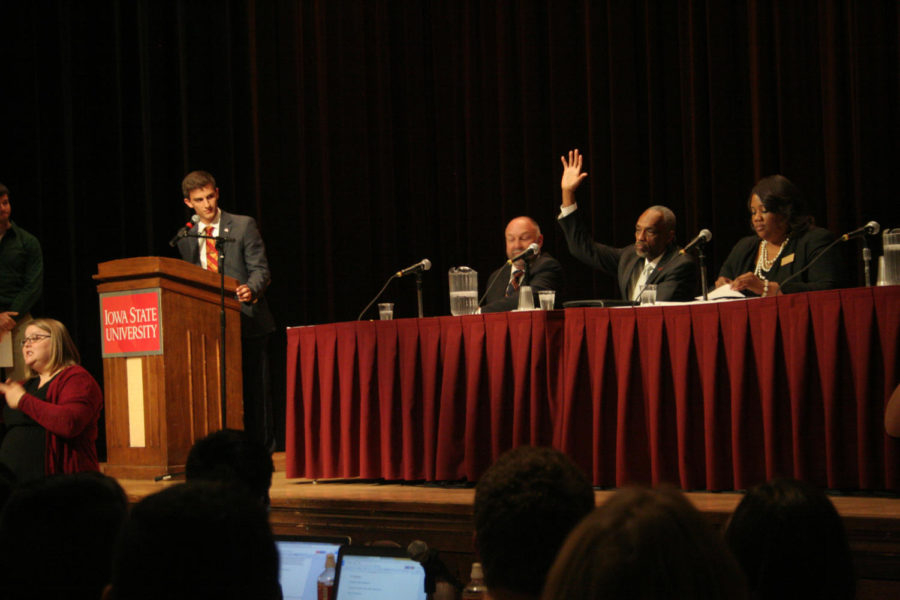Multicultural students present ideas to President Leath
Lindsay Johnson/Iowa State Daily
Faculty members introduce themselves at the Iowa State Community Multicultural Discussion.
September 30, 2015
Unsafe. Discriminated. Unwelcome.
These are the words used to describe how multiple multicultural students feel on the ISU campus every day. And at the “Discussion on Racism, Diversity, and Inclusion at Iowa State,” a public forum hosted by the Office of Multicultural Student Affairs and Student Government on Wednesday night, they shared just how unwelcome they feel.
About 550 ISU students, faculty and staff attended the event, which featured two panels: one of administration and one of multicultural students involved with the group Students Against Bigotry.
The administrative panel included President Steven Leath, Senior Vice President for Student Affairs Thomas Hill and Dean of Students Pamela Anthony.
The main areas of improvement Students Against Bigotry wished to focus on were safety, academic and empowerment for multicultural students, faculty and staff on campus.
“As a community, we need to make an environment where people feel safe enough to report hate crimes,” said Maria Alcivar, graduate student in human development and family studies, who was a member of the Students Against Bigotry panel.
Alcivar discussed ISU Police and its response to the protests and poster-ripping during the Cy-Hawk tailgate Sept. 12.
Alcivar tearfully described when a woman at the protest shoved a hand into her face and was told “you don’t belong here,” and little was done in response.
“I know they have a difficult job,” Alcivar said. “Every cop does.”
But she went on to say that ISU Police failed her that day.
Leath said he knew police had checked the protest scene after calls about disparaging remarks, but said no calls were made to the department regarding problems at the demonstration as the day went on.
Students Against Bigotry panel members expressed their desire for more diversity within the ISU Police Department. The hiring of more women, ethnic minorities and LBGT officers was one of their suggestions.
“We recently expanded the (ISU) police force,” Leath said, adding that 18 percent of the force is made up of ethnic minorities and LBGT community members. Another 21 percent, he said, were women.
Students on the panel also gave anecdotes from their time at Iowa State when they faced racism, sexism and other intolerant acts.
“I have to admit, my freshman year [at Iowa State] was hell,” said Jazmin Murguia, senior in journalism and mass communication.
She said her first roommate made her halloween costume a “Mexican costume,” and used multiple negative stereotypes, such as a mustache.
“I didn’t know how to respond to that,” Murguia said, and that she felt uncomfortable in the situation.
Nautalia Black of Advance Services, spoke about her experience as an African American in the LGBTQA+ community.
“You see the color of my skin, but you don’t know what it’s like to be black and lesbian,” said Nautalia Black of Advance Services.
She presented her grievances in spoken-word poetry.
“Freshman year, [I] found the words ‘n—– d—‘ written on my door,” Black said. “Why can’t [people] see that racism is so much more than Confederate flags and white hoods?”
Leath, Hill and Anthony listened to the experiences of the panel members and gave their responses to the students’ concerns.
“I’m here for you, Tom’s here for you and Pamela’s here for you,” Leath said to the students. “We need to really look at our campus culture.”
Hill responded to student concerns from the standpoint of the leader of Student Affairs.
“I’m sitting here thinking [ISU administrators] missed the mark in creating an environment where people feel comfortable enough to talk about what’s going on,” Hill said after hearing the many concerns of multicultural and minority students. “We don’t have a silver bullet, but we need to work to fix these problems.”
Leath said his search for the newly-created position of vice president for diversity and inclusion was one way his administration was working for better inclusion of minorities.
“This [vice president for diversity and inclusion] will be there to help fix the issues we’re discussing tonight,” Leath said. “I am counting on this person to make a difference.”
Members of Students Against Bigotry made a list of requests, including safety escort range that extended beyond campus grounds and more emphasis on multicultural student services, to send to administration.
Other items included better diversity training for students and faculty, easier access to the Iowa State Conference on Race and Ethnicity and better financial aid to minority students.
Students, faculty and staff from the audience were also able to voice their concerns after the initial panel discussion.
“[Leath’s] actions or lack thereof speak volumes,” said Maurice Washington, graduate student in agriculture and biosystems engineering. “There’s rampant white privilege across campus.”
Washington said the administration uses George Washington Carver and Jack Trice as proof that the university is diversity-centric in terms of minority representation on campus buildings.
“Quit hiding behind George Washington Carver and Jack Trice whenever race and ethnicity issues come up,” Washington said.
Some students in attendance said the forum was productive to the overall conversation.
“I greatly appreciated the discussion,” said Neil Vezeau, senior in animal science and senator in Student Government. “There was much more conversation than I thought there was going to be.”
Anna Castillo, senior in hospitality management, said she liked the attendance.
“I’m happy that [the discussion] happened. The turnout was amazing,” she said.
After hearing from dozens of students, Leath said he had come to a realization that he didn’t realize just how much these students were going through.
“One thing that’s opened my eyes tonight is that [racism and discrimination] is a widespread problem,” he said. “I underestimated the issues you deal with.”

















